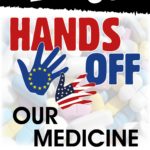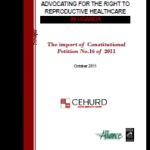
Participatory Approach to Facilitate People Centered Health System
The Regional Network for Equity in Health in East and Southern Africa (EQUINET), TARSC organized a training workshop on participatory methods for a people centered health system which was attended by CEHURD.

National Stakeholder Meeting on Ending Unsafe Abortion in Uganda
Unsafe abortions constitute a huge burden to the health system. Approximately 40% of admissions for emergency obstetric care in Uganda are a result of unsafe abortion. Yet unsafe abortion and its consequences come at a premium: each year, the health system spends up to Ushs7.5 billion on treating...

Meeting Report for NCDs in Uganda Study Sharing & Validation
CEHURD, in partnership with Uganda National Tobacco Control Association (UNTCA) and with support from UNDP, commissioned a study in November, 2013 to assess the status of NCDs in Uganda, analyze perceptions and use of tobacco among youths in universities in Kampala and Mukono districts. Hence a m...

Tobacco and NCDs
Tobacco use is an important modifiable risk factor common to all major NCDs, causing over 16 percent of all NCD deaths. Approximately 5.4 million people die each year due to tobacco and this is expected to rise to over 8 million by the year 2030.

Is Uganda ready to deal with the burden of Non-Communicable diseases?
NCDs particularly; cardiovascular diseases, diabetes, cancers, as well as chronic obstructive pulmonary diseases are becoming increasingly important as causes of morbidity and mortality in the Ugandan population. Uganda has one of the youngest populations in the world, with over 69% of the popula...

Why Work in a Coalition?
Ms. Joy Asasira shares her Experiences, achievements, and challenges working and coordinating a national Coalition and why it is important for CSO working on NCDs & Tobacco to explore the same.

Understanding advocacy and engagement in NCDs and Tobacco Control Advocacy
Tobacco is the only legally available consumer product which kills people when it is used entirely as intended. Tobacco is rated the world’s leading killer; causes cancers of the throat, lungs, stomach, pancreas, kidneys, intestines, cervix and bladder.

Report of the Sectoral Committee on Legal and Parliamentary Affairs on the Industrial Property Bill, 2009
The Industrial Property Bill, 2009 was read for the first time on 9th July 2009 in the 8th Parliament. It was re-introduced by a Resolution of Parliament in the 9th Parliament on 31st October 2011 and re-read for the first time on 23rd February 2012. It was referred to the Committee on Legal and ...

Report of the Sectoral Committee on Legal and Parliamentary Affairs on the Industrial Property Bill, 2009
The Industrial Property Bill, 2009 was read for the first time on 9th July 2009 in the 8th Parliament. It was re-introduced by a Resolution of Parliament in the 9th Parliament on 31st October 2011 and re-read for the first time on 23rd February 2012. It was referred to the Committee on Legal and ...

Resolution Expressing EALA’s Unequivocal Support for an Extension of the Transition Period under Article 66.1 of Trips Agreement for Least Developed Countries (LDCs)
REAFFIRMING THAT Article 66.1 of the Agreement on Trade-Related Aspects of Intellectual Property Rights (the "TRIPS Agreement") accorded Least Developed Country Members a ten-year exemption from most obligations under the TRIPS Agreement in view of the special needs and requirements of the Least ...

Copyright, access to learning materials and the role of University Libraries
Copyright is understood to protect the economic and moral rights of creators of literary, music and other works. The copyright law gives creators exclusive rights to authorise different uses of their works.
The law however attempts to provide a balance between the private rights of creators and ...

Institutional Policy on Copyright as a Tool for Copyright Reform in Uganda
At the September meeting of the Vice Chancellors' Forum in Fort Portal, it was resolved that "copyright reform and the evolution of open institutional IP policies should be on the agenda for their next meeting in December at Uganda Christian University." The Consortium of Ugandan University Libra...

Petition No. 409 Of 2009, Patricia Asero Ochieng, Maurine Atieno, Joseph Munyi & The Aids Law Project V. The Attorney General
The Petitioners aver that the enforcement and application of the Kenyan Anti- Counterfeit Act particularly sections 2, 32 and 34 will endanger their well being as they will be arbitrarily denied access to affordable and essential drugs and medication necessary for the fulfilment of the necessary ...

Joint UN Expert Technical Opinion on Maternal Health and he Right to Health in The Matter of Constitutional Petition No. 16 Of 2011
WHO Country Office, Uganda, was contacted by the Center for Health, Human Rights and Development (CEHURD) on 13th April 2011 requesting for a WHO technical opinion on areas of maternal mortality and right to health in respect of the Constitutional Petition No. 16 of 2011 filed by four petitioners...

In access: Monitoring Access to Maternal Health Commodities in Uganda
At 435 deaths per 100,000 live births, an estimated 6,000 women die from giving birth every year (Ministry of finance 2011). This report summarises trends in availability of Key maternal health commodities at selected public health facilities in Uganda.

Advocating for the Right to Reproductive Health Care in Uganda. The import of Constitutional Petition No.16 of 2011
This brief aims to explain the context of landmark petition the
Center for Health, Human Rights and Development (CEHURD)
and other partners have filed in the Constitutional Court seeking
to secure among others a declaration that non-provision of
essential maternal health commodities in a gove...

Constitutional provisions for the right to health in east and southern Africa
This report presents a desk review of the constitutional provisions on the right to health
in 14 countries in east and southern Africa (ESA) covered by EQUINET: Angola,
Botswana, Kenya, Lesotho, Madagascar, Malawi, Mozambique, Namibia, South Africa,
Swaziland, Tanzania, Uganda, Zimbabwe and Za...

A review of Kenyan, Ugandan and Tanzanian public health law relevant to equity in health
This report presents a review of the public health laws in Kenya, Uganda and Tanzania that impact on equity in health to assess the extent to which the current legal framework addresses public health and health equity, recognising the changing challenges, contexts and policies in all three countr...
- « Previous
- 1
- 2
- 3
- 4

